主将从现的用法_图文4讲义0124280
- 格式:ppt
- 大小:1.18 MB
- 文档页数:2
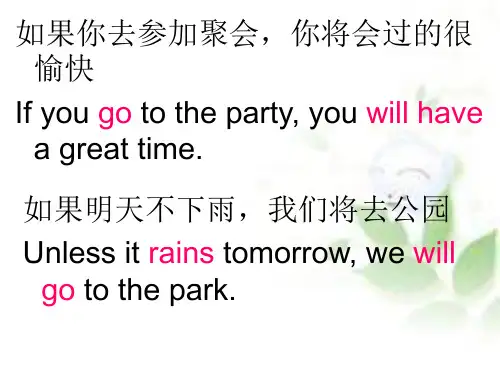
如果你去参加聚会,你将会过的很愉快If you go to the party, you will have a great time.如果明天不下雨,我们将去公园Unless it rains tomorrow, we will go to the park.我一到上海我就给你打电话。
I will call you as soon as I arrive in shanghai.当我长大的时候,我打算做一名篮球运动员。
When I grow up ,I am going to be a basketball player.主将从现通常用在时间状语从句、条件状语从句和让步状语从句中。
主要标志有:if\unless \until\when \as soon as用法一、主将从现1.Can I take Lisa to the aquarium tomorrow? If she________ there, she _______ a good time.A. goes; hasB. will go; hasC. will go; will haveD. goes; will have2.If it ________ this Saturday, we ________ for a picnic.A. won’t rain;shall goB. doesn’t rain; will goC. isn’t rain; goD. doesn’t rain; go如果明天是晴天,让我们去钓鱼吧。
If it is sunny tomorrow,let's go fishing.用法er、祈使句表将来如果明天是晴天,让我们去钓鱼吧。
If it is sunny tomorrow,let's go fishing.1. Don’t talk loudly at the meeting. If you ________, youAwill have to leave.A. doB. areC. did2.Put your hands behind your back. Don’t speak. We’llB_____ in ten minutes.A. backB. be backC. are backD. are back to you3.—Look at the noisy kids!—Haven’t you heard the saying “When the cat is away,Dthe mice ______?”A. playB. playedC. are playingD. will play4.If there is any change to the plan, I ______ you as soon asDpossible.A. toldB. have toldC. tellD. will tellA5..If there no buying and selling of animals, there no killing in nature.A. is; will beB. will be; will beC. is; isD. will be; isIf 表如果主将从现if或whether表“是否”随题意常用将来时我不知道她明天是否去参加聚会。
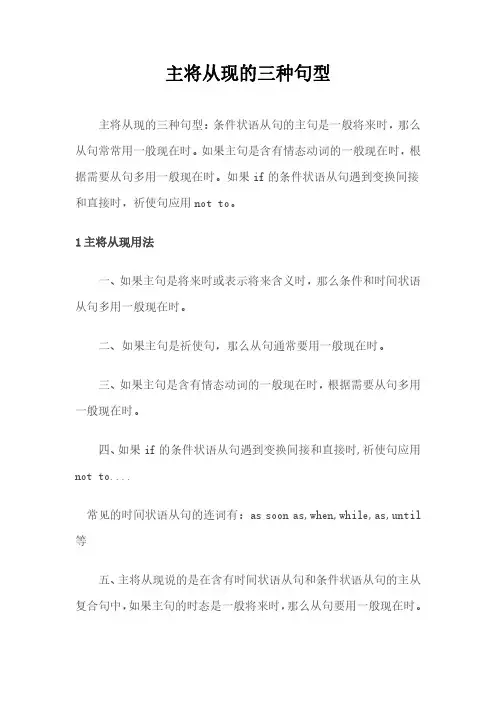
主将从现的三种句型主将从现的三种句型:条件状语从句的主句是一般将来时,那么从句常常用一般现在时。
如果主句是含有情态动词的一般现在时,根据需要从句多用一般现在时。
如果if的条件状语从句遇到变换间接和直接时,祈使句应用not to。
1主将从现用法一、如果主句是将来时或表示将来含义时,那么条件和时间状语从句多用一般现在时。
二、如果主句是祈使句,那么从句通常要用一般现在时。
三、如果主句是含有情态动词的一般现在时,根据需要从句多用一般现在时。
四、如果if的条件状语从句遇到变换间接和直接时,祈使句应用not to....常见的时间状语从句的连词有:as soon as,when,while,as,until 等五、主将从现说的是在含有时间状语从句和条件状语从句的主从复合句中,如果主句的时态是一般将来时,那么从句要用一般现在时。
六、如果主句的时态是过去将来时,那么从句要用一般过去时。
2主将从现的标志词(1)when(当……的时候)。
When,adv.当时;什么时候;(用于时间的表达方式之后)在那时;其时,conj.如果;在…时;既然,pron.什么时候;那时。
(2)whenever(每当)。
Whenever,adv.究竟什么时候;不论何时,conj.每当;无论何时;随时;无论什么时候(3)after(在……之后)。
After,prep.…后的;(表示时间)在…以后;(表示位置、顺序)在…后面,conj.在…以后,adv.以后,继后。
(4)before(在……之前)。
Before,prep.在…之前;先于,优于;当着…的面;与其…,conj.在…之前;在…以前;比…早些;与其…。
(5)as(当……;一边……一边)。
As,adv.同样地,一样地;例如,prep.作为,以…的身份;如同,conj.由于;像,像…一样;同时,当…时;尽管。
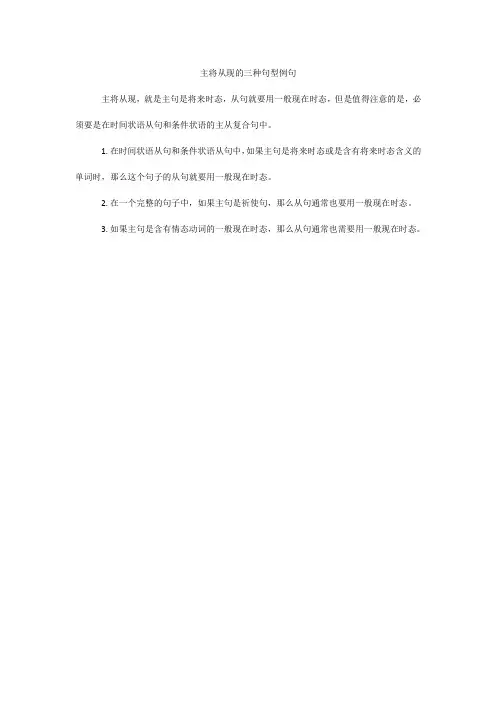
主将从现的三种句型例句
主将从现,就是主句是将来时态,从句就要用一般现在时态,但是值得注意的是,必须要是在时间状语从句和条件状语的主从复合句中。
1.在时间状语从句和条件状语从句中,如果主句是将来时态或是含有将来时态含义的单词时,那么这个句子的从句就要用一般现在时态。
2.在一个完整的句子中,如果主句是祈使句,那么从句通常也要用一般现在时态。
3.如果主句是含有情态动词的一般现在时态,那么从句通常也需要用一般现在时态。
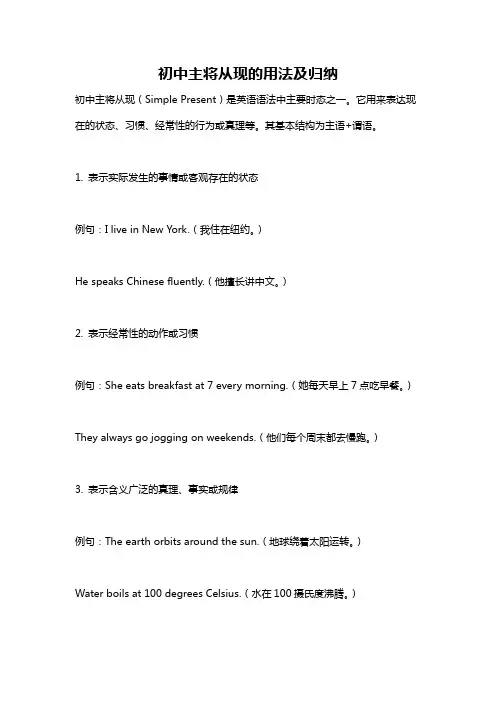
初中主将从现的用法及归纳初中主将从现(Simple Present)是英语语法中主要时态之一。
它用来表达现在的状态、习惯、经常性的行为或真理等。
其基本结构为主语+谓语。
1. 表示实际发生的事情或客观存在的状态例句:I live in New York.(我住在纽约。
)He speaks Chinese fluently.(他擅长讲中文。
)2. 表示经常性的动作或习惯例句:She eats breakfast at 7 every morning.(她每天早上7点吃早餐。
)They always go jogging on weekends.(他们每个周末都去慢跑。
)3. 表示含义广泛的真理、事实或规律例句:The earth orbits around the sun.(地球绕着太阳运转。
)Water boils at 100 degrees Celsius.(水在100摄氏度沸腾。
)4. 表示主观感受或态度例句:I love watching movies.(我喜欢看电影。
)She hates getting up early.(她讨厌早起。
)5. 表示命令、建议、要求等意愿例句:Don’t forget your keys.(别忘了你的钥匙。
)Please open the window.(请打开窗户。
)6. 表示现在进行时例句:I am reading a book now.(我正在看书。
)They are studying for the test.(他们正在准备考试。
)初中主将从现的用法总结如下:1. 表示现实、事实或状态2. 表示经常性的行为和习惯3. 表示真理、事实或规律4. 表示主观感受和态度5. 表示命令、建议、要求等意愿6. 表示现在进行时初中主将从现的否定形式一般在谓语前面加上“don’t”或“doesn’t”,疑问形式则将“do”或“does”提到主语前面。
其特殊疑问句可通过疑问词引导:what, when, where, why, how等。
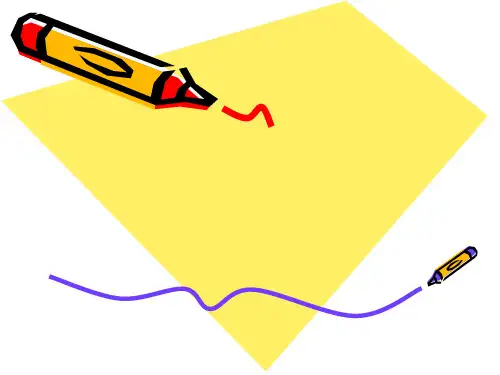
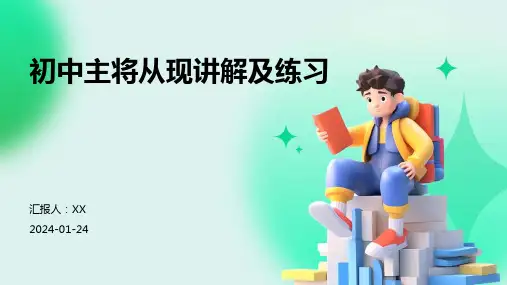
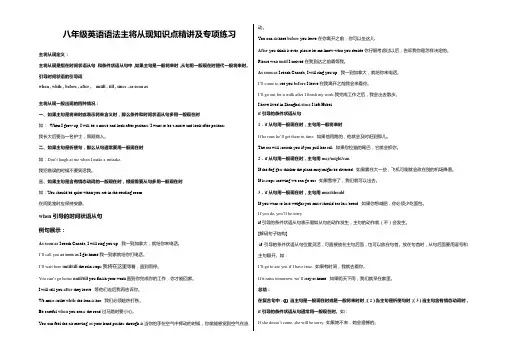
八年级英语语法主将从现知识点精讲及专项练习主将从现定义:主将从现是指在时间状语从句和条件状语从句中,如果主句是一般将来时,从句用一般现在时替代一般将来时。
引导时间状语的引导词when , while , before , after , untill , till , since , as soon as主将从现一般出现的四种情况:一、如果主句是将来时或表示将来含义时,那么条件和时间状语从句多用一般现在时如:When I grow up, I will be a nurse and look after patients/ I want to be a nurse and look after patients.我长大后要当一名护士,照顾病人。
二、如果主句是祈使句,那么从句通常要用一般现在时如:Don’t laugh at me when I make a mistake.我犯错误的时候不要笑话我。
三、如果主句是含有情态动词的一般现在时,根据需要从句多用一般现在时如:You should be quiet when you are in the reading room在阅览室时应保持安静。
when引导的时间状语从句例句展示:As soon as I reach Canada, I will ring you up. 我一到加拿大,就给你来电话。
I’ll call you as soon as I get home.我一到家就给你打电话。
I’ll wait here until/till the rain stops.我将在这里等着,直到雨停。
You can’t go home until/till you finish your work.直到你完成你的工作,你才能回家。
I will tell you after they leave. 等他们走后我再告诉你。
We must strike while the iron is hot. 我们必须趁热打铁。
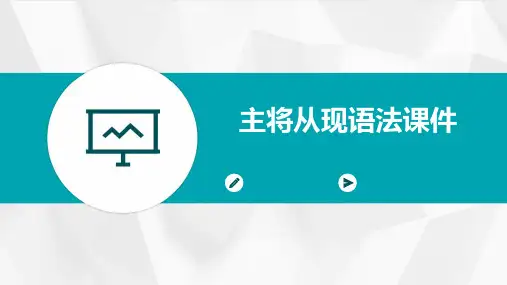
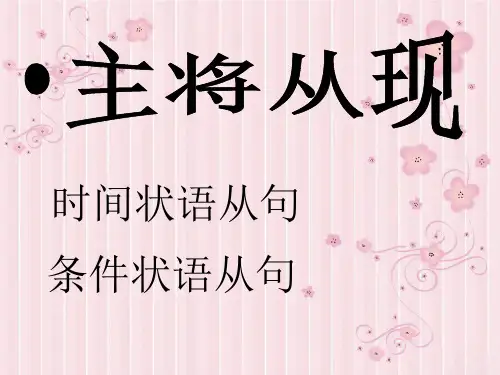
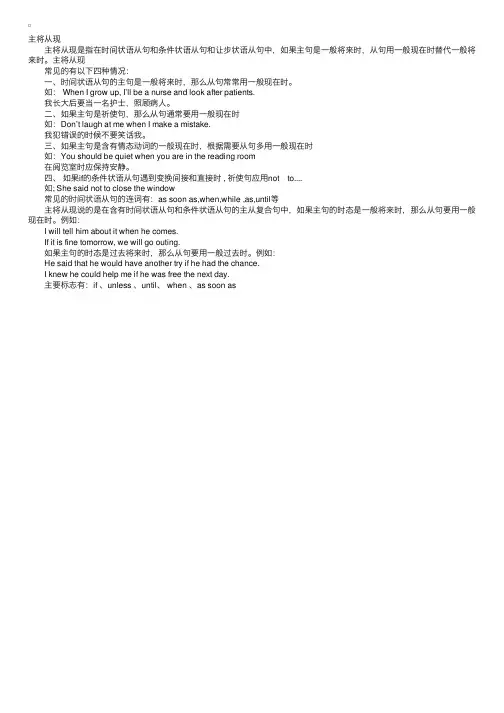
主将从现 主将从现是指在时间状语从句和条件状语从句和让步状语从句中,如果主句是⼀般将来时,从句⽤⼀般现在时替代⼀般将来时。
主将从现 常见的有以下四种情况: ⼀、时间状语从句的主句是⼀般将来时,那么从句常常⽤⼀般现在时。
如: When I grow up, I’ll be a nurse and look after patients. 我长⼤后要当⼀名护⼠,照顾病⼈。
⼆、如果主句是祈使句,那么从句通常要⽤⼀般现在时 如:Don’t laugh at me when I make a mistake. 我犯错误的时候不要笑话我。
三、如果主句是含有情态动词的⼀般现在时,根据需要从句多⽤⼀般现在时 如:You should be quiet when you are in the reading room 在阅览室时应保持安静。
四、如果if的条件状语从句遇到变换间接和直接时 , 祈使句应⽤not to.... 如; She said not to close the window 常见的时间状语从句的连词有:as soon as,when,while ,as,until等 主将从现说的是在含有时间状语从句和条件状语从句的主从复合句中,如果主句的时态是⼀般将来时,那么从句要⽤⼀般现在时。
例如: I will tell him about it when he comes. If it is fine tomorrow, we will go outing. 如果主句的时态是过去将来时,那么从句要⽤⼀般过去时。
例如: He said that he would have another try if he had the chance. I knew he could help me if he was free the next day. 主要标志有:if 、unless 、until、 when 、as soon as。
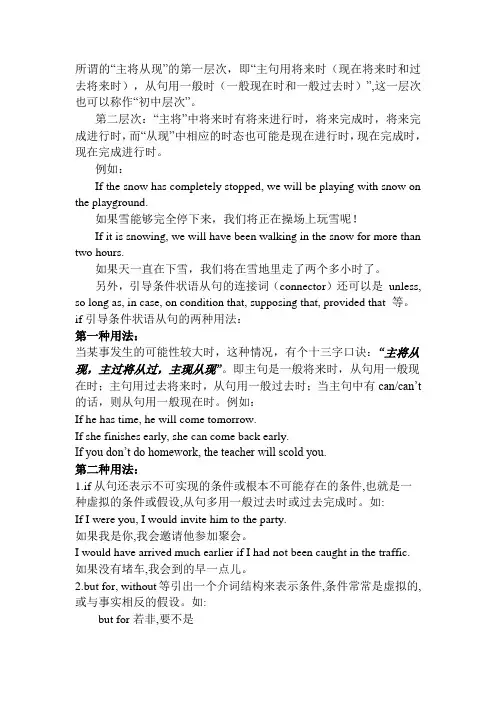
所谓的“主将从现”的第一层次,即“主句用将来时(现在将来时和过去将来时),从句用一般时(一般现在时和一般过去时)”,这一层次也可以称作“初中层次”。
第二层次:“主将”中将来时有将来进行时,将来完成时,将来完成进行时,而“从现”中相应的时态也可能是现在进行时,现在完成时,现在完成进行时。
例如:If the snow has completely stopped, we will be playing with snow on the playground.如果雪能够完全停下来,我们将正在操场上玩雪呢!If it is snowing, we will have been walking in the snow for more than two hours.如果天一直在下雪,我们将在雪地里走了两个多小时了。
另外,引导条件状语从句的连接词(connector)还可以是unless, so long as, in case, on condition that, supposing that, provided that 等。
if引导条件状语从句的两种用法:第一种用法:当某事发生的可能性较大时,这种情况,有个十三字口诀:“主将从现,主过将从过,主现从现”。
即主句是一般将来时,从句用一般现在时;主句用过去将来时,从句用一般过去时;当主句中有can/can’t 的话,则从句用一般现在时。
例如:If he has time, he will come tomorrow.If she finishes early, she can come back early.If you don’t do homework, the teacher will scold you.第二种用法:1.if从句还表示不可实现的条件或根本不可能存在的条件,也就是一种虚拟的条件或假设,从句多用一般过去时或过去完成时。
如:If I were you, I would invite him to the party.如果我是你,我会邀请他参加聚会。
英语主将从现的用法主将从现是英语中一个非常常见的语法现象,它是指在时间状语从句和条件状语从句中,用现在时态代替将来时态的用法。
也就是说,I.如果从句的表意是一般将来时,就要用一般现在时代替;II.如果从句表意是将来进行时,就要用现在进行时代替;III.如果从句表意是将来完成时,就要用现在完成时代替。
本文通过主将从现在时间状语从句和条件状语从句中的用法,分别详解主将从现的实际运用。
一、条件状语从句中的主将从现(常见引导词有if、unless、as long as)例句1:You will regret it if you don't follow my words. 如果你不按我说的做,你会后悔的。
注释:主句中用的是一般将来时,从句本来也应该是用一般将来时。
但是,在条件状语从句中用一般现在时(if you don't follow)代替一般将来时(if you will not follow)。
例句2:I will call you, but you don't have to answer my phone unless you are not having a class. 我会给你打电话,但是除非你到时候不在上课,否则你就不用接电话。
注释:从整个句子的时间来看,从句本应该是将来进行时。
由于是在条件状语从句中,所以用现在进行时(unless you are not having)代替将来进行时(unless you will not be having)。
例句3:As long as we have completed the task by the end of next month, we will certainly be praised. 只要我们再下个月底前完成这个任务,我们肯定会被表扬。
注释:从条件状语从句的时间状语"by the end of next month"可以看出这里本来应该用将来完成时。
主将从现主将从现是指在时间状语从句和条件状语从句和让步状语从句中,如果主句是一般将来时,从句用一般现在时替代一般将来时。
常见的有以下四种情况:一、如果主句是将来时,那么条件和时间状语从句多用一般现在时如:When I grow up, I’ll be a nurse and look after patients.我长大后要当一名护士,照顾病人。
二、如果主句是祈使句,那么从句通常要用一般现在时如:Don’t laugh at me when I make a mista ke.我犯错误的时候不要笑话我。
三、如果主句是含有情态动词的一般现在时,根据需要从句多用一般现在时如:You should be quiet when you are in the reading room在阅览室时应保持安静。
四、如果if的条件状语从句遇到变换间接和直接时, 祈使句应用not to....如; She said not to close the window五、在主将从现中有倒装的情况。
例如:If he doesn't go to the theater,neither will I.常见的时间状语从句的连词有:as soon as,when,while ,as,until等主将从现说的是在含有时间状语从句和条件状语从句的主从复合句中,如果主句的时态是一般将来时,那么从句要用一般现在时。
例如:I will tell him about it when he comes.If it is fine tomorrow, we will go outing.如果主句的时态是过去将来时,那么从句要用一般过去时。
例如:He said that he would have another try if he had the chance.I knew he could help me if he was free the next day.主要标志有:if 、unless 、until、when 、as soon as。